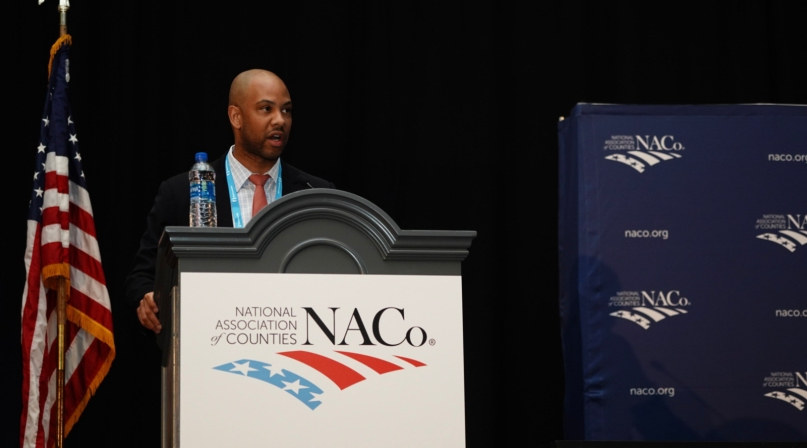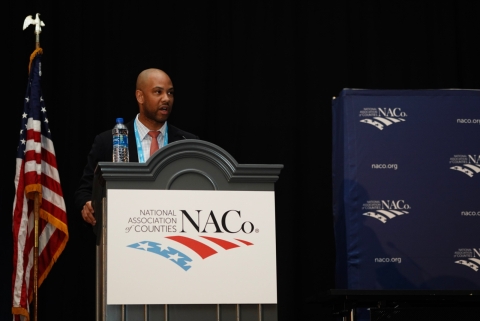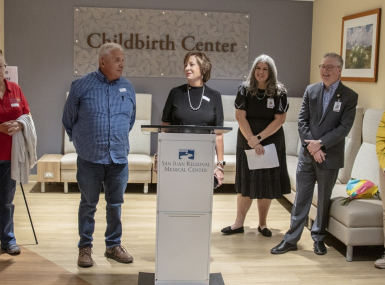Counties use ARP funds to advance equity
Author
Upcoming Events
Related News

Key Takeaways
The American Rescue Plan (ARP) represents an opportunity to advance equity, according to Clarence Wardell III, the chief data and equitable delivery officer with the White House Rescue Plan team.
Wardell spoke to county officials July 11 during the 2021 Annual Conference. He also serves as a senior advisor for policy implementation and delivery with the White House Domestic Policy Council and discussed the Biden administration’s approach to equity.
“The American Rescue Plan represents an opportunity like no other that I’ve seen in my lifetime,” he said.
The actions counties take now will determine whether implementation of ARP contributes to reversing the widening disparities across socio-economic outcomes, he noted.
He described how Biden’s executive order on advancing racial equity provides a framework for this work.
The executive order defines equity as the consistent and systematic, fair and impartial treatment of all individuals, including individuals who belong to underserved communities that have been denied such treatment.
“At its core, equity means centering those communities, not excluding others but making sure you’re addressing the needs of communities and individuals either willfully or unintentionally excluded previously,” Wardell said.
To ensure those in need are being met in the most meaningful and transformative ways possible, Wardell highlighted the importance of ensuring individual programs and initiatives are delivered and executed in equitable ways.
“I would encourage us to think about the ways in which the pandemic has exacerbated equities in our communities,” he said.
Wardell emphasized the need to address money loss, access to quality childcare and housing instability in comprehensive ways.
“Deciding what to invest in is only one piece of the puzzle,” he said. “We can’t make an investment decision and walk away. We have to be invested in making sure that those programs and initiatives are delivered well and in ways that are advancing equity.”
To advance initiatives in equity, Wardell offered a few key principles:
-
Design for ‘hardest to reach’ and most in need
-
Design programs to ensure everyone will benefit — think about awareness, accessibility
-
Building short cycles of feedback to inform qualitative discussions
“I think we really must ensure that we are investing in things that have a strong evidence base,” he said. “If they don’t, we make sure we’re building structures with rigorous resources [and] rigorous evaluation into our process to make sure that we’re building that evidence base as we go.”
King County, Wash. was ground zero for COVID-19, seeing the first deaths from the virus in the country.
After closures and shutdowns from the pandemic and the virus disproportionately affecting communities of color, King County Assessor John Wilson said the county knew they had to view the situation through an equity lens.
“Over and over again, we realized that we have an undeniably racial disparity,” he said.
The county received over $440 million in American Rescue Plan funds and plans to put the money toward public health, community organizations, community support, workforce training and invest in BIPOC businesses and economic resilience funds. (The acronym refers to black, indigenous and other people of color, and aims to emphasize the historic oppression of black and indigenous people.)
“If you didn’t quickly realize the equities COVID revealed, you simply weren’t paying attention to what was happening around us,” he said.
In Harris County, Texas, the county has taken steps even before the COVID-19 pandemic to become an equitable economy, according to Deputy Director of Policy Sasha Legette.
Minorities make up 62 percent of the county’s population, she said, and when COVID-19 hit, like in many states across the country, communities of color were disproportionately affected.
“Racism is in fact a public health crisis and for far too long, there has been an inequitable distribution of resources creating an uneven playing field in Harris County,” Legette said.
The county decided to use equity framework to assess and ensure American Rescue Plan dollars were going to be spent in an equitable distribution of resources.
“We saw a major opportunity to bolster our commitment to equity, using our ARPA dollars and how those funds were going to be distributed,” she said.
Harris County, Texas Lead Policy Advisory Janae Ladet said the county’s framework contains goals, strategies and approaches to advance equity within products and programs.
The equity framework is applied to each project funded through ARPA dollars.
“We find that this framework has already forced our county to start thinking about equity and we’re already seeing a shift in some of our programs and policies,” she said.
James Crowder, a senior associate at Policy Link, a national resource action institute, referenced 10 priorities as a framework for advancing racial equity through the American Rescue Plan:
-
Explicitly name racial equity as a goal
-
Engage historically underserved communities
-
Connect unemployed and low-wage workers with good jobs
-
Stabilize and grow POC (person of color) and immigration-owned businesses
-
Restore and expand public services
-
Invest in frontline, COVID-impacted communities
-
Prevent displacement and increase community ownership
-
Strengthen civic infrastructure
-
Prioritize a few cross-sector, high-impact equity investments
-
Track disaggregated data to ensure accountability

Attachments
Related News

Now I know I can adapt my communication style
San Juan County, N.M. Commissioner Terri Fortner spent her career working with people one-on-one, but she overcame hangups about online communication when the pandemic forced her onto video calls when she first took office.

County service meets a veteran’s need for purpose in Spotsylvania County, Virginia
After Drew Mullins transitioned from a high-performance lifestyle in the military, he found the environment and purpose he sought when he took office in his county.
Now I know that solid waste is complicated
Custer County, Idaho Commissioner Will Naillon says solid waste removal is "one of the things that people often take for granted until it’s their job to make sure it happens... that’s the story of being a county commissioner."
